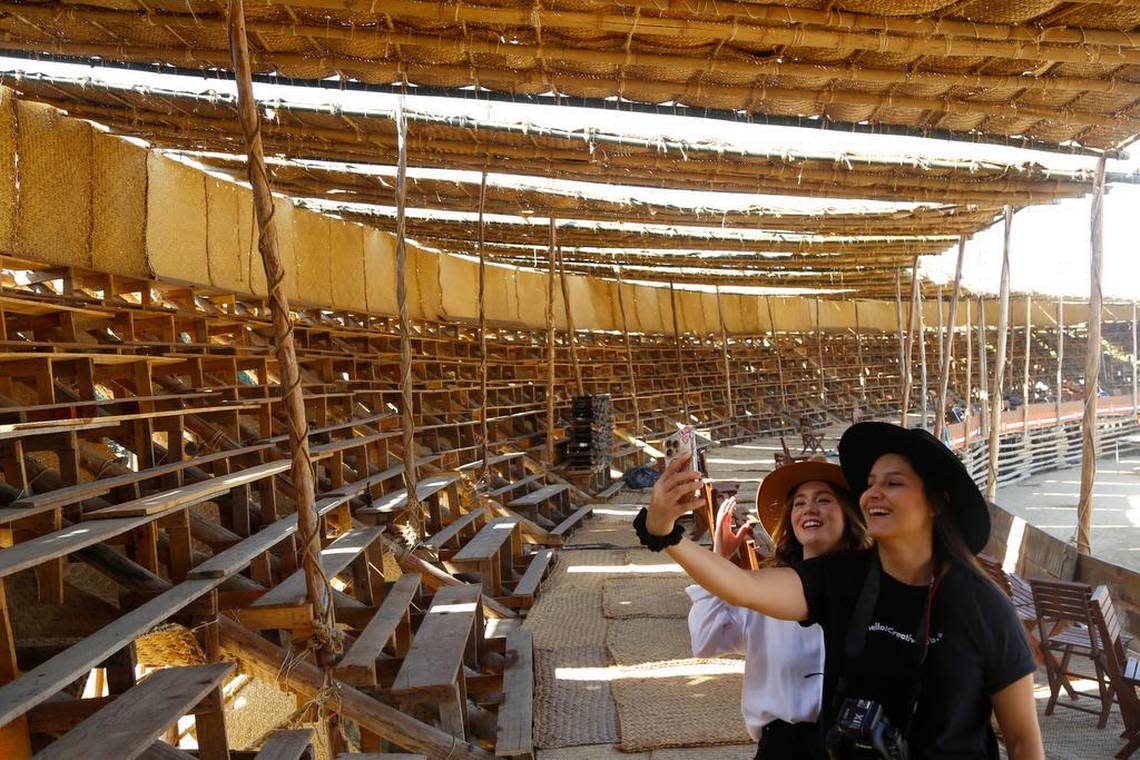Annually constructed, dismantled bull ring a source of pride for Mexican town
Inhabitants of a western Mexican town are wrapping up the construction of a bull ring that is made with natural materials like bamboo, draws on ancestral knowhow dating back nearly 120 years and is built and dismantled annually.
The rush of activity in Villa de Alvarez, a town located near the like-named capital of the southwestern state of Colima, begins in December when around 65 families organize festivities in honor of patron saint Felipe de Jesús, whom they rely on to help protect them from earthquakes or eruptions of the highly active Colima Volcano, a fire mountain located just a few kilometers away.
As the end of the year is approaching, the town’s inhabitants start mapping out their plans for the “La Petatera” bull ring, which will be the epicenter of the festivities that begin on Feb. 10 with a cabalgata (procession or parade of horseback riders) from the city of Colima.
Most of the local residents are proud to lend a hand with the construction of the bull ring, which is built by the community in five to seven weeks with artisanal materials, techniques and knowledge that their ancestors used as far back as 1907.
Ignacio Cervantes, inspector of the wood used for the bull ring, said during a pause in the last stage of the work that the arena represents knowledge passed down by their ancestors and is a symbol of the town’s identity.
“We practically carry it in our blood. The families here have instilled in their children and grandchildren a love for the tradition of building the bull ring. It’s an inheritance and a tradition, an inheritance because my father instilled it in me, a tradition because Villa de Álvarez is its bull ring,” said the son of one of the main drivers of this initiative.

Initially, the bull ring was a simple stone and wood beam corral-like enclosure. But starting in the mid-20th century, a group of inhabitants came up with a design for the ring that included ground-floor seating areas and also 50 raised viewing platforms, later increased to 70.
Standing just over five meters (16 feet) tall, that structure with an area of 5,000 square meters (53,750 square feet) and a capacity for nearly 6,000 spectators is erected with a range of materials: different types of local wood, bamboo, istle (a hard plant fiber obtained from a number of Mexican plants, chiefly agave species), as well as petates (traditional bedrolls in that region that are woven from the fibers of the Palm of petate).
Rafael Contreras Molina, who is directing the project, said that families who are owners of one or more viewing platforms are expected to supply the materials for building the bull ring, adding that many of them also contribute their own labor and knowhow.
“’La Petatera’ is a source of pride for the ‘Villalvarenses,’ especially for those who build it,” he said, adding that a strong emotion takes hold when the work is done, the final Saturday arrives and they can “say it’s ready.”
A total of 5,414 tree trunks of different sizes, nearly 3,000 petates, 915 lengths of rope made from istle fiber totaling about 15.7 kilometers, 1,960 boards for seating areas and footrests, 560 hooks and 250 kilos (550 pounds) of nails are used in erecting the bull ring.

Families spend up to 10,000 pesos ($532) to build their raised seating area. But the cost proves to be well worth it for the view it offers of the bullfights, horse shows and concerts.
As old photographs attest, ‘La Petatera’ has attracted some of Mexico’s most famous entertainers, including ranchera singers Pedro Infante and Vicente Fernandez, comedian, actor and filmmaker Cantinflas, and contemporary recording artists Marco Antonio Solís, Cristián Nodal and Grupo Firme.
During the two weeks of festivities, the bull ring also serves as a space where Villalvareneses catch up with friends or with family members who emigrated to the United States or who still live in the town.
Luis Romero Virgen, one of those involved in the bull ring’s construction, said that the structure takes seven weeks to build but is torn down in between five and 10 days, although he stressed that sustainability is a priority and care is taken to reuse the materials.
“We’ll take it down in a week or a week and a half because we want to protect the wood. The more carefully and calmly we take it down the less damage we do. There are now lots of us in this world and we’re wiping out our ecosystem and we have to keep taking care of it,” he said.
